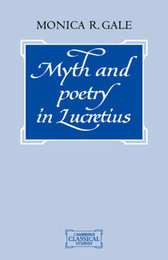
|
Myth and Poetry in Lucretius
Hardback
Main Details
Description
The employment of mythological language and imagery by an Epicurean poet - an adherent of a system not only materialist, but overtly hostile to myth and poetry - is highly paradoxical. This apparent contradiction has often been ascribed to a conflict in the poet between reason and intellect, or to a desire to enliven his philosophical material with mythological digressions. This book attempts to provide a more positive assessment of Lucretius' aims and methodology by considering the poet's attitude to myth, and the role which it plays in the De Rerum Natura, against the background of earlier and contemporary views. The author suggests that Lucretius was not only aware of the tension between his two roles as philosopher and poet, but attempted to resolve it by developing his own, Epicurean poetic, together with a bold and innovative theory of the origins and meaning of myth.
Reviews"What makes her [Gale] discussion exciting, at least for this reader, is the sense that this complex of ideas remains vital after two millennia; it is far more robust and viable than notions of aestheticism, art for art's sake, or the autonomous text." Classical Views "Gale offers a rigorous reading and well-worked out theory of the use of the divine images in a work that is repudiating divinity. Her exploration and meticulous examination of the structural elements of his poem offers a theory of meaning much more sophisticated than usually attributed to the poet and that shows how Lucretius anticipated much of modern science and philosophy." The Reader's Review "Gale readily acknowledges the debts of this many-sided study to previous scholarship, but her lively, useful, and illuminating book has more than repaid its debt by establishing a coherent relationship between Lucretian epistemology and poetics, which does not simply extenuate but vindicates the honey on the cup." Phoenix "This is an important book on a topic of continuing discussion. It offers some creative ways of treating Lucretius' combination of myth and poetry as what he surely meant it to be: a realization of the true meaning of his Master's thought." Bryn Mawr Classical Review "This is, quite simply, a superb book, the merits of which I haven't the space to expound properly, nor is it possible to engage the author in the many particulars which one should very much like to argue. Gale has provided a deep and intelligent study of what must be conceded to be matters of crucial concern in understanding Lucretius...she is thorough, judicious and fair to those scholars with whom she takes issue...she writes pleasingly well: it is a genuine pleasure to see literature and philosophy discussed with such clarity. This book very much belongs on the same shelf as Diskin Clay's Lucretius and Epicurus and Philip Hardie's Cosmos and Imperium." W. Jeffery Tatum, Classical World
|